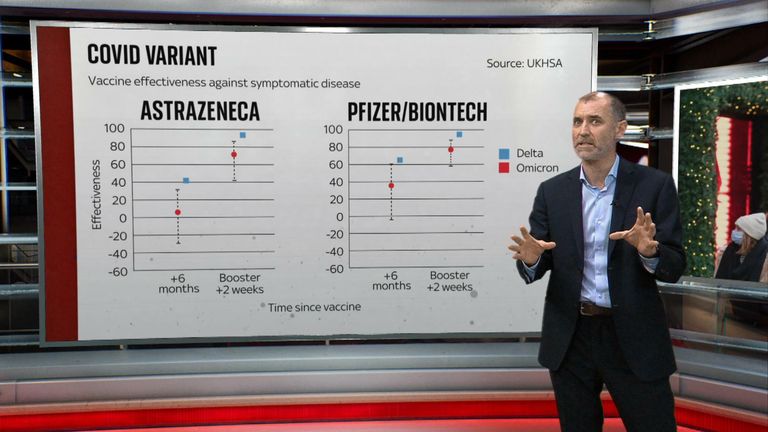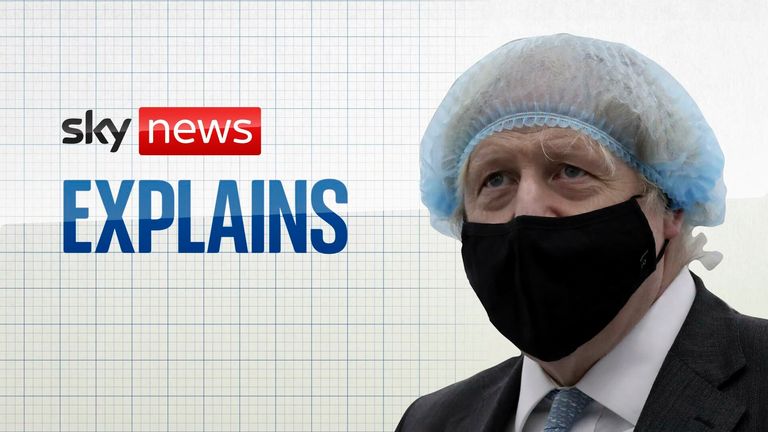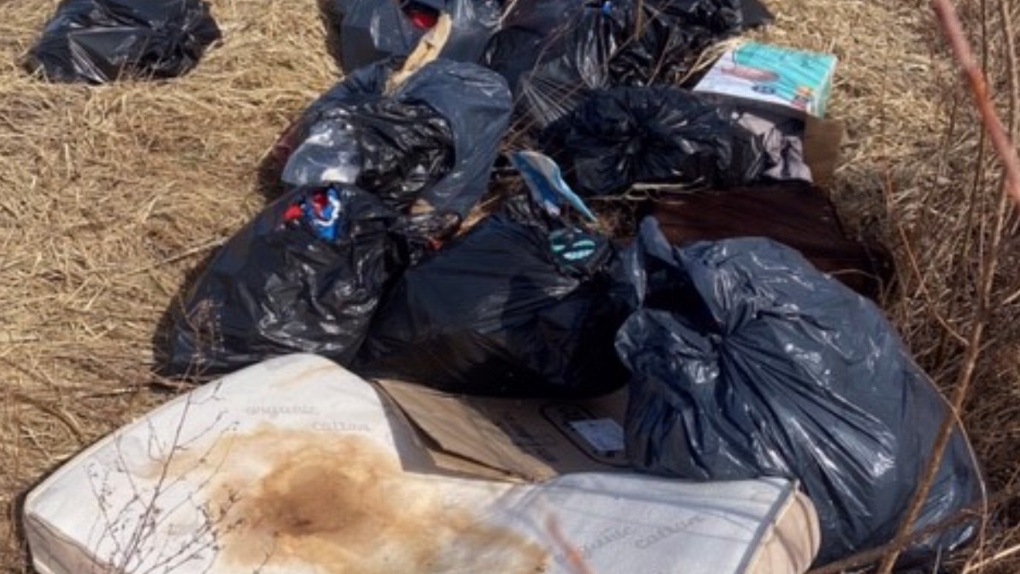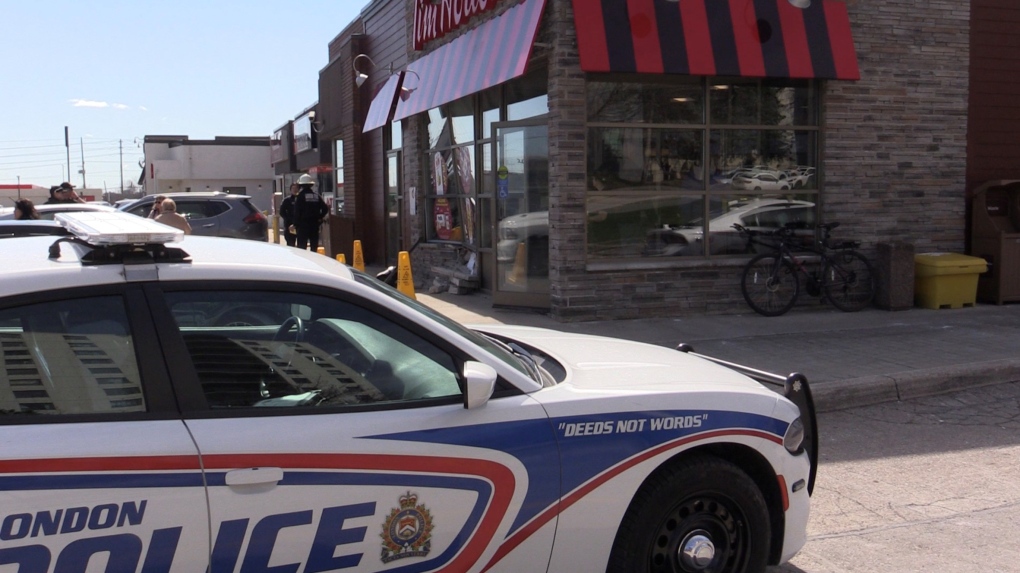The Omicron variant could cause between 25,000 and 75,000 deaths in England over the next five months if no additional measures are taken beyond Plan B, according to experts.
New modelling from the London School of Hygiene & Tropical Medicine (LSHTM) used experimental data to look at how Omicron may spread as the country heads into 2022.
The study, which has not yet been peer-reviewed, suggests that Omicron could potentially cause more COVID cases and hospitalisations in England than during the wave of January 2021, if additional control measures are not taken.
Expert predicts alcohol curfew and Christmas party ban – COVID latest
Under the best-case scenario, the variant could lead to a peak of more than 2,000 daily hospital admissions, with 175,000 hospitalisations and 24,700 deaths between 1 December 2021 and 30 April 2022, the projection suggests.
The optimistic scenario is one where Omicron’s immunity escape is low and boosters prove highly effective.
3:16
What is Plan B?
Measures such as restrictions on indoor hospitality, closure of some entertainment venues, and limits on gathering sizes from early next year would be sufficient to substantially control this wave, reducing hospitalisations by 53,000 and deaths by 7,600, the experts say.
Under the worst-case scenario (high immune escape and lower effectiveness of boosters), if no additional control measures are taken, there could be 492,000 hospitalisations and 74,800 deaths.
In the daily update on Saturday, another 54,073 COVID cases were announced in the latest 24-hour period.
A further 132 deaths have been recorded.
Stronger measures may be required
In this scenario, the experts estimate that stronger measures may be required to keep the number of hospital admissions below the January 2021 peak.
What ‘Plan C’ restrictions could we see if Plan B fails to curb the spread of Omicron?
Omicron: ‘It’s like a bomb’ – New COVID strain sweeps through South Africa township
Dr Rosanna Barnard, who co-led the research, said that while there is still a lot of uncertainty over Omicron, “these early projections help guide our understanding about potential futures in a rapidly evolving situation”.
“In our most optimistic scenario, the impact of Omicron in the early part of 2022 would be reduced with mild control measures such as working from home,” she said.
How quickly is Omicron spreading?
“However, our most pessimistic scenario suggests that we may have to endure more stringent restrictions to ensure the NHS is not overwhelmed.
“Mask-wearing, social distancing and booster jabs are vital, but may not be enough.
“Nobody wants to endure another lockdown, but last-resort measures may be required to protect health services if Omicron has a significant level of immune escape or otherwise increased transmissibility compared to Delta.
“It is crucial for decision-makers to consider the wider societal impact of these measures, not just the epidemiology.”
Mass testing could avoid extra measures
Her co-author of the study, Dr Nicholas Davies, told a briefing of science journalists that a strategy of mass lateral flow testing in workplaces could be effective in controlling the epidemic and avoiding some additional control measures.
Both Dr Barnard and Dr Davies are on the government’s Scientific Pandemic Influenza Group on Modelling, which advises the Department for Health and Social Care.
Omicron may be more infectious – but do we need to worry if it causes less severe disease?
How are the rules on face masks and COVID passes changing in England?
Any move towards more restrictive measures is likely to be unpopular with some Conservative MPs, with one of those who has criticised lockdowns in the past, Steve Baker, claiming that the latest rules imposed by the government last week will cause “immense harm”.
What is Plan B?
‘Vote no to all these measures’
Writing for The Critic website, Mr Baker, who is deputy chair of the COVID Recovery Group (CRG) of backbench Tory MPs who opposed the second lockdown, said: “It is long past time to finally, openly and honestly count the cost of lockdowns and restrictions and vote no to all these measures.
“That is the only way to get off this road to the hell of… ever changing restrictions on our lives…”
It is unclear how many Conservative MPs are part of the CRG, but, in the past, the government has won votes on tougher restrictions with support of other parties.
Numerous experts have said there are signs Omicron may cause symptoms that are milder, or at least no more severe than previous variants, but hospitalisations and deaths could rise simply because it has the potential to cause so many cases.
What the government says
“We continue to look closely at all of the emerging data,” a Government spokesperson said.
“We’ve been clear throughout that vital vaccines and boosters are our best line of defence against this virus and that is why we are urging people to come forward as quickly as possible as they become eligible.
“Plan B remains a proportionate response based upon what we know, so we encourage everyone to follow the rules by wearing a face covering, working from home if you can, testing regularly and coming forward for your booster when called.”
What do the experts say?
While the modelling is gloomy, experts say it is just one projection and the government usually relies on the results of several studies of the same type in making its decisions. It is also early days for Omicron and, therefore, the modelling is likely to be refined as time goes on.
Ian Jones, professor of virology at the University of Reading, said: “It is worth stressing that the level of uncertainty around Omicron is high and the consequences of infection in a largely immune population are hard to estimate.
Inside a Cambridge research lab battling Omicron
“In particular, the relative role played by neutralizing antibodies, non-neutralizing antibodies and T-cells in the overall protective response are simply not known. If these turn out to be better than assumed, hospitalisations may not reach the numbers presented here.”
Paul Hunter, professor in medicine at the University of East Anglia, added: “With yesterday’s report from UKHSA it looks like the high escape and high booster efficacy is the most likely model. So, not their most pessimistic projections but still substantial numbers of increased cases, hospital admissions and deaths.
‘Another difficult winter’
“Vaccine efficacy estimates are not consistent with the early data from UKHSA. This data suggests poorer protection from two doses but better from booster than used in the model.
“However any model is only as good as its assumptions and one key assumption in this model is that severity of disease outcomes for Omicron is the same as for Delta. Although we will not know for certain for a few weeks, indications from South Africa do suggest that Omicron does cause less severe disease than Delta.
“If Omicron is indeed associated with less severe disease… then these models would overestimate hospital admissions and deaths, possibly substantially.”
However, Dr Michael Head, senior research fellow in global health at the University of Southampton, said: “As things stand right now, the numbers… are alarming. They illustrate clearly that we will be in for another difficult winter.”
https://news.sky.com/story/covid-19-omicron-could-cause-between-25-000-and-75-000-deaths-in-england-without-tougher-restrictions-experts-12492584







